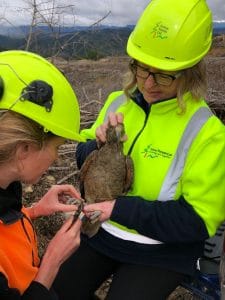Funded by OneFortyOne (formerly Nelson Forests)
(2019-2023)
The KCT is very excited to be partnering with OneFortyOne to better understand and support kea utilising plantation forests in the top half of the South Island. $100,000 donated by OneFortyOne over the next 5 years will be used to fund the following research and programmes:
- Conflict Transformation Programme.
- Citizen Science Research - How important are plantation forestry sites to kea populations?
- Research project - Kea habitat use and diet in plantation forests of Nelson, New Zealand.
In addition to programme funding, there is also an opportunity for OneFortyOne to contribute in-kind support to developing, trialling and assessing a variety of kea proofing strategies and tools at forestry sites. This information would then be disseminated via the KCT website to help others experiencing issues with kea, thereby directly benefiting local kea and the human communities who co-exist with them.
Through involvement with OneFortyOne, the contract workforce can also be involved, which would result in a more direct way of engagement and development of empathy for the programme and better sharing of ideas. This work will also identify the direct and indirect costs (financial and social) to the plantation forest industry of working in the rohe of Kea. This information, to date, has been predominantly anecdotal. The costs to machinery / equipment and to kea (social) will be quantified as well as the costs of distraction / mitigation. OneFortyOne is keen to help and wants people to understand the value that can be gained by finding methods that reduce damage (directly and indirectly to the industry) and safeguard Kea.
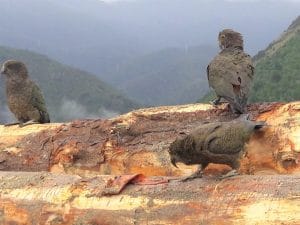
Project details
1. Conflict Transformation Programme
Funding proposed: $7,000/annum for part funding of Conflict Coordinator, Top of the South position.
In-kind Support: Reporting of conflict situations at forestry sites; trialling of kea proofing methods and tools; GIS mapping of kea conflict locations and kea sightings.
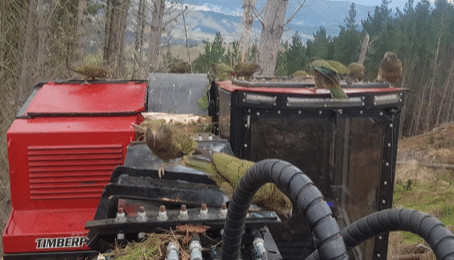
Description: Kea have survived an extended and extensive level of persecution with over 150,000 killed in a bounty system over a 100 year period. Although now fully protected, conflict is still a major threat for kea with the majority of conflict cases occurring in the Tasman area and a high proportion occurring at forestry sites.
The Conflicts programme is a core KCT project which has run since 2014. This is extremely important work; resolving conflict situations throughout the region which could otherwise escalate, putting local kea populations at direct risk of harm from people. For more information please visit our Conflicts Resolution page.
2. Citizen Science Research - How important are plantation forestry sites to kea populations?
Funding proposed: $7,000/annum for catching, banding and collection of biodata and data entry support.
In-kind support: Reporting of kea sightings at forestry sites (to enable banding of un-banded birds and reporting band details of banded individuals); GIS mapping of kea sightings.
Description: Colour banding of kea provides important re-sighting opportunities which give information on individual kea survivorship, social affiliations, movement and status of populations over time. Although we know kea visit forestry sites, we currently don’t know how many or how mobile these birds are, or whether they regularly hold territories within managed forests or choose instead to breed in adjacent native bush areas. Individually identifying birds will enable some of these questions to be answered and for additional research work to be carried out as opportunity arises.
3. Research project – Kea habitat use and diet in plantation forests of Nelson, New Zealand
Funding proposed: $11,000/annum.
In-kind support: Access support
Description:
The objectives of this project are to gain an understanding of kea habitat use and diet in plantation forest habitats.
- Determine how much time kea spend in plantation forests versus non-plantation forest sites using GPS (Global Positioning System) technology and visual observations.
- Use behavioural observations of kea feeding in plantation forests and kea faecal samples col-lected in plantation forests to identify kea diet in this habitat.
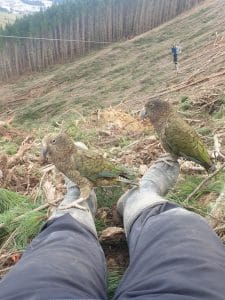
Outcomes
Year 3: Sept 2021- August 2022
- Conflict Transformation Programme
- Research Project - All field work, data analysis and write ups were completed early 2022 and a Masters thesis submitted. Jodanne presented the outcomes of her research at the Kea Conservation Trusts Kea Summit in Queenstown June 2022 and submitted an initial report to OFO in September 2022. Published outcomes and follow up recommendations will be posted online March 2023.
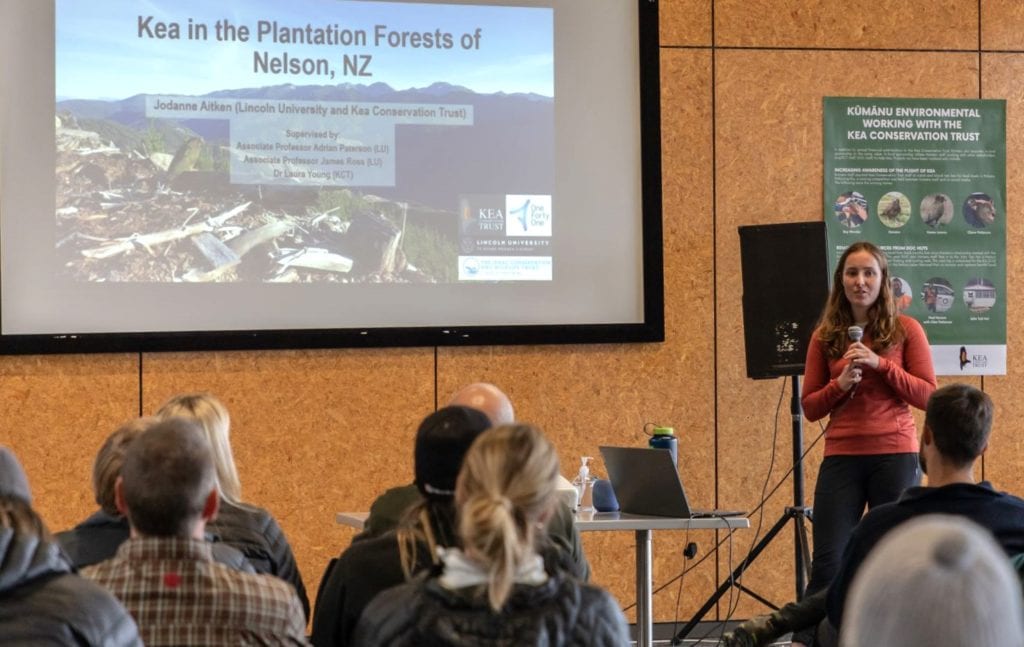
Year 2: Sept 2020 – August 2021
- Conflict Transformation Programme
- Research Project - final project methodology and all permit requirements approved. Field work for the project began at the beginning of 2021 and involved banding, collecting biodata and attaching GPS transmitters to kea to track their movements. All handling of kea was overseen by one of our Senior (L3) kea banders and KCT Field Coordinator, Dr Laura Young.
Year 1: Sept 2019 – August 2020
- Conflict Transformation Programme
- Citizen Science Research - OneFortyOne partnered up with NZFOA to help catch, band and blood lead test five forestry kea in the Tasman area on the 9th September. All kea returned low blood lead levels and can now be monitored between sites to ascertain their movements.
- Research Project - Lincoln University Masters student's (Jodanne Aitken) proposal “Kea habitat use and feeding preferences in exotic forestry blocks of Nelson, New Zealand”, received and accepted.
